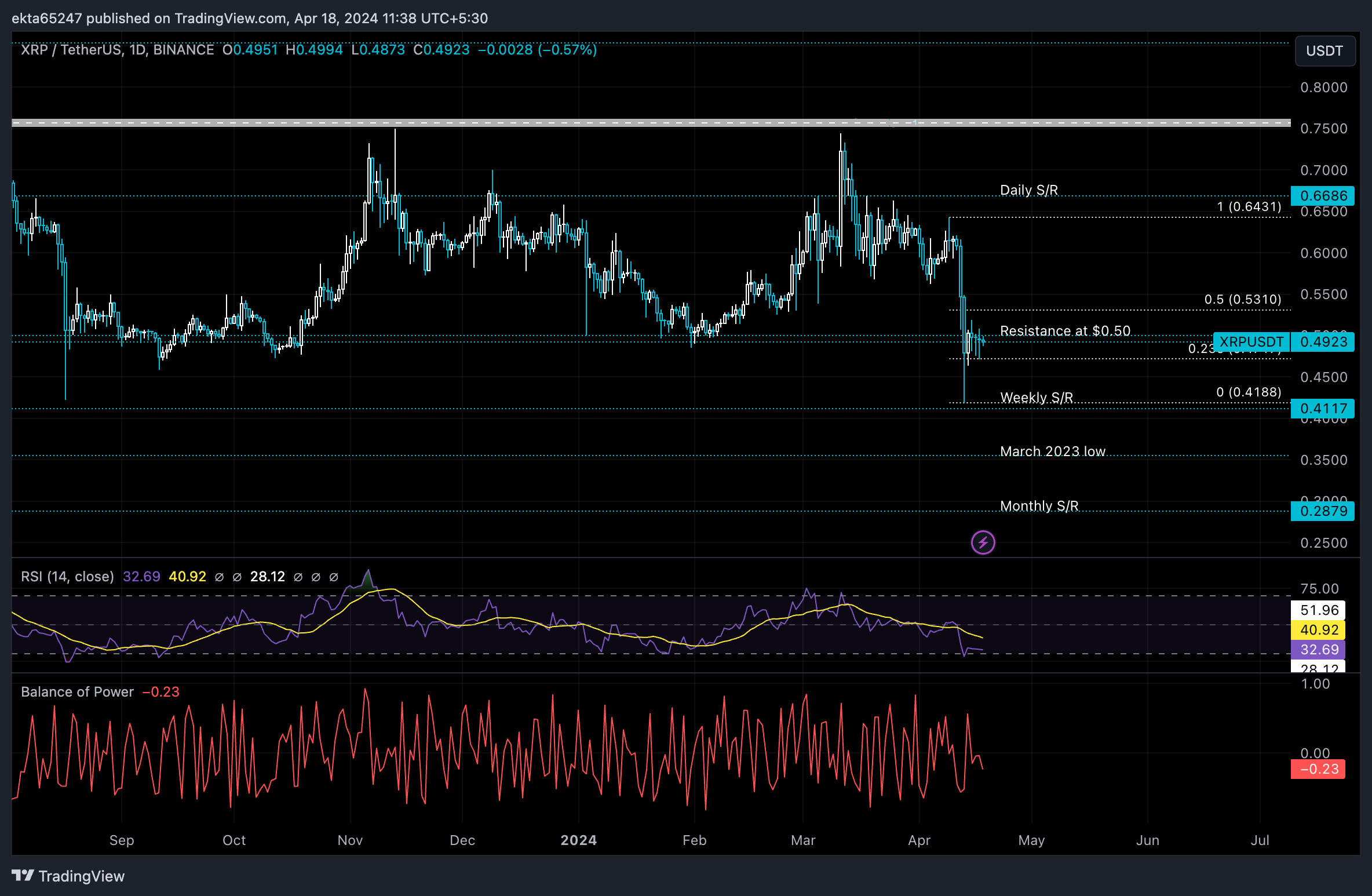- The SEC vs. Ripple potential showdown at the Supreme Court is likely, says former SEC litigator Ladan Stewart.
- XRP Ledger calls developers, businesses and investors to build on the blockchain, extending Apex 2024 registration until April 30.
- XRP price remains below $0.50, failing to breach key resistance.
Ripple (XRP) price hovers below the key $0.50 level on Thursday after failing at another attempt to break and close above the resistance for the fourth day in a row.
XRP’s subdued performance – its price has fallen by around 20% in the last seven days – comes amid a broad crypto market correction and as market participants continue to discuss the lingering legal battle between Ripple and the Securities Exchanges Commission (SEC). Former SEC litigator Ladan Stewart said on Wednesday that Ripple is likely to face a Supreme Court showdown with the US financial regulator.
Daily digest market mover: Ripple, SEC could spar in the Supreme Court
- Former SEC litigator Ladan Stewart spoke on a panel alongside blockchain lawyers, including Rebecca Rettig of Polygon, according to a Fortune Crypto report on Wednesday. Stewart shared her perspective on the agency’s approach to the blockchain sector, and the SEC’s lawsuits against Ripple and Coinbase.
- Stewart said that the agency is unlikely to back off from bringing regulatory cases against crypto firms. The former SEC litigator said that the agency’s lawsuit against Ripple is likely to make its way to the Supreme Court. The issue of what constitutes a security remains unsettled and Stewart said that there will be some clarity on this.
- Ripple secured a partial victory against the regulator in July. However the firm faces massive fines of nearly $2 billion.
- The SEC is likely to appeal the programmatic sales ruling from 2023 that considers XRP’s secondary market sales on exchanges as “not investment contracts” or not securities transactions.
Technical analysis: XRP likely to sweep March 2023 lows
Ripple hit its 2023 top of $0.7440 on March 11. Since then, XRP has been in a steady downtrend that seems to have bottomed out this week, with XRP price hovering below resistance at $0.50. The $0.50 level is an important one for XRP holders as the altcoin held steady support at this price for nearly seven months.
XRP price could deteriorate further, sweeping liquidity at the weekly support at $0.4188, the April 13 low. The March 2023 low of $0.3553 and monthly support at $0.2879 are the other two support levels for XRP in case of an extended correction.
The Balance of Power (BoP) technical indicator that assesses the relative strength of buyers and sellers is typically used to identify potential trend shifts and reversals in an asset. XRP BoP is negative 0.23, below the zero line. The drop in BoP is in convergence with the decline in XRP price and implies that sellers are dominant in the market.
Traders waiting on the sideline to buy XRP need to await a trend reversal signal or a divergence between BoP and XRP price.

XRP/USDT 1-day chart
A daily candlestick close above the $0.50 level could invalidate the bearish thesis and suggest a recovery in the altcoin. XRP faces resistance at $0.50, $0.53 (the 50% Fibonacci retracement of the decline from April 9 top of $0.64 to April 11 low of $0.41), and the April 9 top of $0.64.
SEC vs Ripple lawsuit FAQs
It depends on the transaction, according to a court ruling released on July 14: For institutional investors or over-the-counter sales, XRP is a security. For retail investors who bought the token via programmatic sales on exchanges, on-demand liquidity services and other platforms, XRP is not a security.
The United States Securities & Exchange Commission (SEC) accused Ripple and its executives of raising more than $1.3 billion through an unregistered asset offering of the XRP token. While the judge ruled that programmatic sales aren’t considered securities, sales of XRP tokens to institutional investors are indeed investment contracts. In this last case, Ripple did breach the US securities law and will need to keep litigating over the around $729 million it received under written contracts.
The ruling offers a partial win for both Ripple and the SEC, depending on what one looks at. Ripple gets a big win over the fact that programmatic sales aren’t considered securities, and this could bode well for the broader crypto sector as most of the assets eyed by the SEC’s crackdown are handled by decentralized entities that sold their tokens mostly to retail investors via exchange platforms, experts say. Still, the ruling doesn’t help much to answer the key question of what makes a digital asset a security, so it isn’t clear yet if this lawsuit will set precedent for other open cases that affect dozens of digital assets. Topics such as which is the right degree of decentralization to avoid the “security” label or where to draw the line between institutional and programmatic sales are likely to persist.
The SEC has stepped up its enforcement actions toward the blockchain and digital assets industry, filing charges against platforms such as Coinbase or Binance for allegedly violating the US Securities law. The SEC claims that the majority of crypto assets are securities and thus subject to strict regulation. While defendants can use parts of Ripple’s ruling in their favor, the SEC can also find reasons in it to keep its current strategy of regulation by enforcement.
The court decision is a partial summary judgment. The ruling can be appealed once a final judgment is issued or if the judge allows it before then. The case is in a pretrial phase, in which both Ripple and the SEC still have the chance to settle.

























